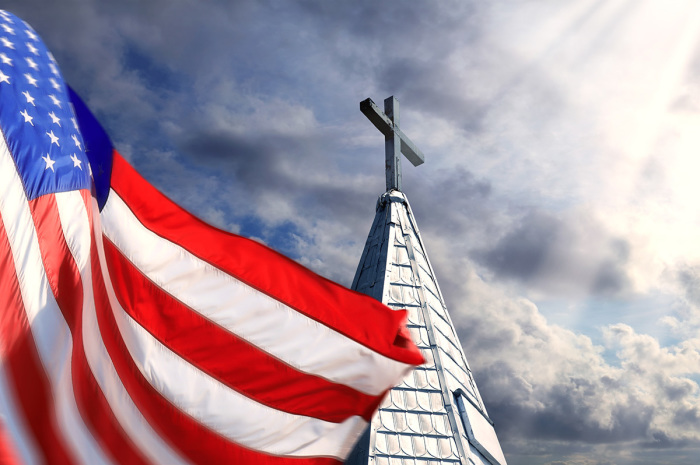Which states are the worst at protecting religious freedom of faith groups? New study reveals

A new study from a religious liberty nonprofit highlights which states have the highest and the lowest level of religious freedom protections for faith-based nonprofits at a time when many religious beliefs are increasingly scrutinized under state laws and regulations.
The Washington, D.C.-based Napa Legal, which exists to educate religious nonprofit leaders on corporate and legal issues, has released its first annual Faith and Freedom Index, which ranks the 50 states by their level of hospitality for faith-based nonprofits.
The index gives states an overall score and individual scores based on religious freedom and regulatory freedom. A state’s religious freedom score considers “key issues related to a nonprofit’s freedom to pursue its mission in accordance with its sincerely-held beliefs.”
Napa Legal Executive Director Mary Margaret Beecher said in a statement Wednesday that “faith-based nonprofits face threats to their religious freedom and the often-crushing weight of regulatory burdens.”
“The Index is unprecedented in that it takes the perspective of faith-based nonprofits themselves,” she added. “We evaluate state laws not from an ivory tower but with a focus on their practical impact.”
“Faith-based nonprofits bring education, spiritual and moral formation, and humanitarian services to our communities. The Faith and Freedom Index shows how we can do more to value this important work.”
Factors determining a state’s religious freedom score include the presence or absence of a “state constitutional protection of free exercise,” “state Religious Freedom Restoration Act,” “religious freedom for nonprofits with public programming,” “religious freedom for faith-based employers,” “protections for religious liberty in [a] state of emergency” and a “Blaine Amendment” that restricts the ability of faith-based organizations to participate in public benefit programs.
Nevada and Maryland ranked the lowest when it comes to religious freedom, receiving respective scores of 18% and 20%. Napa Legal described the two states as possessing “only weak and ambiguous protections for faith-based nonprofits’ religious freedom.”
According to the whitepaper report, Maryland "has several policies that are burdensome to faith-based nonprofits operating in the state, such as an audit requirement to maintain charitable solicitation registration, no RFRA, and laws regarding public accommodations that include no meaningful exemptions for religious organizations."
Meanwhile, Nevada, also "has several policies that are burdensome to faith-based nonprofits operating in the state, such as a broad Blaine Amendment, no RFRA, and laws
regarding public accommodations that include no meaningful exemptions for religious
organizations."
Other states that received low scores on religious freedom include Michigan (22%), Vermont (23%), Massachusetts (26%) and Wisconsin (26%).
On the other hand, the top scores for religious freedom went to Alabama and Texas, which received scores of 86% and 70%, respectively.
“Both states require government burdens on religious freedom to pass the most rigorous tests. Texas features a state constitutional amendment expressly protecting religious worship,” Napa Legal explained.
Other states that received high religious freedom scores include Mississippi (67%), Kentucky (64%), Kansas (60%) and New Mexico (60%).
The regulatory freedom score categorizes states based on their “laws that impact day-to-day operations at a faith-based nonprofit,” specifically whether “state laws make it straightforward or difficult for a nonprofit to successfully operate and comply with the law.” Factors influencing a state’s regulatory freedom score include the presence or absence of sales or use taxes, exemptions to property taxes for religious organizations and exemptions to corporate taxes for religious nonprofits.
The states that scored highest in regulatory freedom were Oregon (90%), Indiana (88%) and Montana (87%). Napa Legal maintains that “these states set up nonprofits for success by featuring simple, user-friendly fundraising requirements and tax regimes.”
Other states identified as possessing a high level of regulatory freedom include Wyoming (84%), Iowa (84%) and Missouri (81%).
By contrast, the lowest scores for regulatory freedom went to Michigan (39%) and Wisconsin (42%) because of what Napa Legal describes as “complicated tax requirements and burdensome fundraising obligations.” Additional states with similarly low regulatory freedom scores include Maryland (44%), Connecticut (45%), Illinois (45%) and North Dakota (46%).
The religious freedom and regulatory freedom scores combined to form a state’s overall score on the Faith and Freedom Index. Alabama and Texas came out on top, with overall scores of 75% and 72% on the index.
“These states unambiguously protect religious freedom while also setting up nonprofits for success through straightforward corporate, tax, and fundraising regimes,” Napa Legal concluded.
States at the other end of the spectrum include Michigan (29%), Maryland (29%) and Nevada (32%), which received low overall scores due to “complicated regulatory regimes and only minimal protections for faith-based organizations.”
Ryan Foley is a reporter for The Christian Post. He can be reached at: [email protected]



























